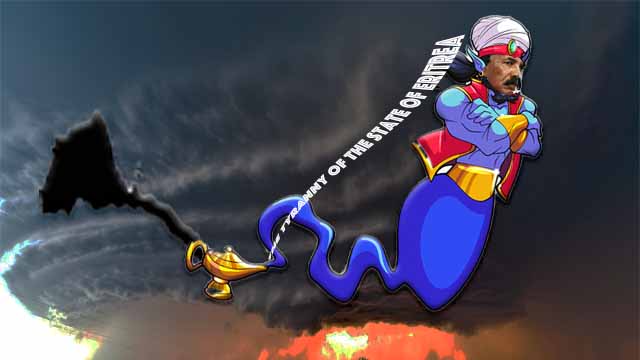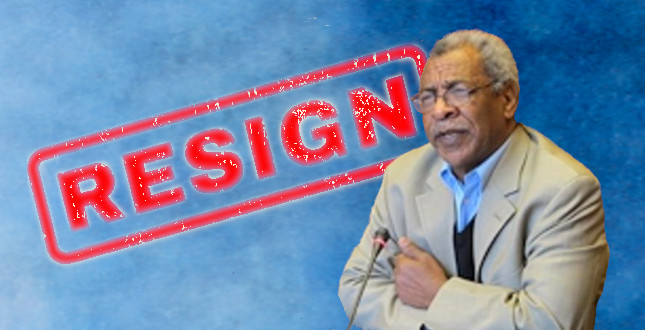Eritrea: It is left to us!

Seasonal river
In words worth describing the on/off modes of our Eritrean opposition activities in its quest for justice, the narrator of the short story “The Great Wall of China” by the 20th-century novelist Franz Kafka says describing his times:
“Consider rather the river in spring. It rises until it grows mightier and nourishes more richly the soil on the long stretch of its banks, still maintaining its course until it reaches the sea, where it is all the more welcome because it is a worthier ally… But after that the river overflows its banks, loses outline and shape, slows down the speed of its current, tries to ignore its destiny by forming little seas in the interior of the land, damages the fields, and yet cannot maintain itself for long in its new expanse, but must run back between its banks again, must even dry up wretchedly in the hot season that presently follows.”
Tyranny’s a never sleeping genie
The story above is a perfect allegory of the image of the Eritrean opposition movements in the Diaspora in its Sisyphean seasonal rise and fall patterns: a wonderful rise and then the inevitable fragmentation following every flare up. The season is recycled for the parties, and with it starts building from the ground again upwards from where it began last time and not a fresh start to build over an existing platform. And like its predecessor it will fly high and fall from the summit down to fade and wither.
Meanwhile, tyranny, a 24/7 business, tirelessly continues doing what it has to do in the quest for total control. The real advantage that tyranny has over its enemies in the Eritrean space, is that it has a repository where every piece of its past experience in resisting its opponents is stacked, every thread is followed up to its final destination: the Repository. And next time it needs to manifest its power, it will not ride a fresh start but will start from where it left last time, taking into account the employment of the past, manipulating and tweaking it first, to fit its present purposes of centralized hold of all the strings all the time.
Chronic Deficiency
But tyranny, despite its fancy misnomer “Government of the State Of Eritrea”, suffers one great and fatal deficiency: Legitimacy! This is a basic commodity for justifying a rule, any rule, and that commodity is one that tyranny cannot possibly procure and may not compensate for by applying violence on its source (The people).
The lack of legitimacy that tyranny suffers from is, in fact, the source of all the pretensions, simula-tions, and self-arrogation; all the symbols, all the rags, all the decorum, all the public functions, all the high-pitched nationalism, all the national anthems, all the battle-cries, all the Generals, all the Colonels, all the embassies and ambassadors, All these and many more are all a farce intended to cover the gaping hole that is the absence of legitimacy, one that tyranny, because of its unmindful nature, thinks is its only Achilles’ heel.
For the sake of blocking reality and maintaining the looks, all resources of the nation are diverted from the necessary to where it feeds its dear insatiable masquerade, which, however, in the end, deceives no one; the people see, know it, and feel its fatal effects. The world too is not blinded by the show, it knows the truth, but it is not in the business of searching or identifying tyranny behind a government or not and would rather accept the appearance as it comes. the mask is enough for its pragmatic purposes: It is for those who suffer the consequences to challenge tyranny and uncover its treacherous trappings and masks and force the world to take notice and respect them, not tyran-ny. If there is no one except tyranny claiming representation of the Eritrean People at that level, then tyranny’s word is to be believed for pragmatic reasons unless and until someone at that same level proves, contends, and rivals for legitimacy of representation.
Face, address, and personality
Nicole Hirt of the German Institute of Global and area studies (GIGA) authored a research paper with a long and curious title: “The Eritrean Diaspora: savior or Gravedigger of the regime? Di-aspora Responses to the imposition of UN sanctions”. As much as the study is interesting and masterful, we don’t, here, need to go into its findings’ detail now, and the only reason for dropping this topic here is to emphasize that Eritreans recognize the pivotal role played by the Diaspora and that the knowledge of this fact is not restricted to us Eritreans not only but also foreigners recog-nize the fact for what it is.
One cannot, of course, exaggerate the contributions of this Eritrean class in the long war of independence which reflected in its immediate influence in the shaping of the newly born Eritrean State, and it may not be far from the truth to state that the Eritrean Diaspora, because of ignorance or otherwise, had the lion’s share in establishing and helping the consolidation of tyranny in Eritrea. Isaias couldn’t have been what he is now, all by himself, without the early sustenance and encouragement of this class of Eritreans. Ironically, this is the same class that now the Eritrean Nation’s fate is hanging upon since the Eritrean Societies inside Eritrea have been scraped and hollowed and indeed left in no position to revolt or affect change.
It is all on the shoulders of the Eritrean Diaspora, as all Eritreans outside Eritrea have to take the initiative and improvise ways to dislodge the genie off the back of Eritrea. The defeat of tyranny in Eritrea starts with its defeat outside Eritrea.
Diaspora Eritreans have, indeed, in the last few years, displayed some impressive shows of resistance to tyranny in Eritrea, but these were like momentary non-incremental flare-ups like a meteorite, in a summer night shooting itself across the sky, glowing briefly and then fade as if it never was. And likewise, the shows of the Diaspora Eritreans would leave nothing behind it not even a scratch on the face of tyranny to show that there was a struggle the night before. For this, and even more, to happen, the continuity of the shows’ effects should outlast the absence of the show presenters. This also cannot be achieved except by bringing the different groups’ contribution to pour into a common reservoir to store it in an elevated post to create momentum with increasing pressure every time a drop is added, thus re-invigorating the movement, each time a drop is added will re-invigorate the movement anew. The movement should have a symbolic body that can be pointed at as one entity representing a plurality, the movement should have an Address, a face, and a personality. That will be the moment when the movement for justice in our country is ready to compete for legitimacy and hold tyranny by its ‘Achilles heel’. it is not only that, but the creation of a government in exile translating directly into the creation of diplomatic muscle for all justice seekers with the implication of seeing their natural tactical moves transform into strategic political acts, instead of recycling old fruitless methods.
there is a need for a government in exile now, this is the moment of need for its creation considering the shadow projected by the war in Tigray and considering the shadow of the Amhara elite’s avaricious eyes and openly stated intentions. when then, if not at these times? The creation and formation of the Government in exile will be a major landmark in the way of defending and freeing our people and country. And if some oppose this move, as there will , naturally or otherwise, be, the rest should go on with the idea, skeptics may, and surely join later.
In closing this essay it comes to mind the narrator of the other short story by F. Kafka (old manuscript) who, on seeing the realms of his city collapsing under the weight of a Barbarian Army whose members are so lowly as to put no barriers between their physical needs and the others’ properties to the extent of helping themselves with anything and everything that people have, including food, without the pretension of paying or advancing excuses, the narrator says: “It is left to us artisans and tradesmen to save our country.”



Awate Forum